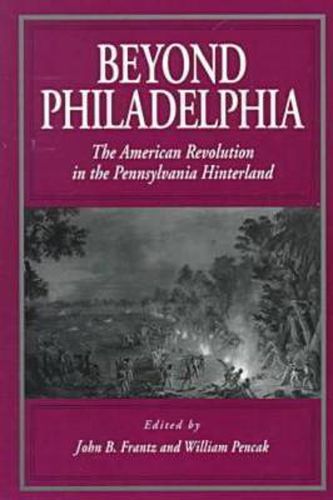Readings Newsletter
Become a Readings Member to make your shopping experience even easier.
Sign in or sign up for free!
You’re not far away from qualifying for FREE standard shipping within Australia
You’ve qualified for FREE standard shipping within Australia
The cart is loading…






This book moves the story of Pensylvania’s pivotal role in the American Revolution beyond familiar Philadelphia into the rural areas to the north and west. It covers not only the city’s surrounding counties of Bucks and Chester but also the interior areas of the Lehigh, Schuylkill, Susquehanna, and Juniata River valleys. What was the ethnic, religious, and political makeup of Pennsylvania on the eve of revolt? Who supported the Revolution and who opposed it? What role did native Americans play? Did the Revolution produce social, politica, and economic change? The nine essays in Beyond Philadelphia represent the current state of our knowledge on how most Pennsylvanians experienced the Revolution. The introduction and afterword set the essays in the context of early Pennsylvania history and the course of the American Revolution in other states. From these essays, we can see three patterns of Revolution in Pennsylvania. The oldest counties near Philadelphia gave little support, had large numbers of neutral Quakers and active Loyalists, and endured sporadic partisan warfare. The central region of the state supported the Revolution almost unanimously. It contributed mightily to the Continental Army in men and production of the sinews of war. On the frontiers, brutal guerrilla warfare involving Indians and rival white claimants for land began before the Revolution and continued after it ended, resulting in economic devastation, Here, the Revolution was but an episode in a local struggle for survival. Beyond Philadelphia will interest all readers who seek a better understanding of how the American Revolution was experienced throughout Pennsylvania. Contributors are Tim H. Blessing, Robert G. Crist, Paul E. Doutrich, John B. Frantz, Karen Guenther, Owen S. Ireland, Gregory T. Knouff, William Pencak, Eugene R. Slaski, Frederick J. Stefon, and Rosemary S. Warden.
$9.00 standard shipping within Australia
FREE standard shipping within Australia for orders over $100.00
Express & International shipping calculated at checkout
This book moves the story of Pensylvania’s pivotal role in the American Revolution beyond familiar Philadelphia into the rural areas to the north and west. It covers not only the city’s surrounding counties of Bucks and Chester but also the interior areas of the Lehigh, Schuylkill, Susquehanna, and Juniata River valleys. What was the ethnic, religious, and political makeup of Pennsylvania on the eve of revolt? Who supported the Revolution and who opposed it? What role did native Americans play? Did the Revolution produce social, politica, and economic change? The nine essays in Beyond Philadelphia represent the current state of our knowledge on how most Pennsylvanians experienced the Revolution. The introduction and afterword set the essays in the context of early Pennsylvania history and the course of the American Revolution in other states. From these essays, we can see three patterns of Revolution in Pennsylvania. The oldest counties near Philadelphia gave little support, had large numbers of neutral Quakers and active Loyalists, and endured sporadic partisan warfare. The central region of the state supported the Revolution almost unanimously. It contributed mightily to the Continental Army in men and production of the sinews of war. On the frontiers, brutal guerrilla warfare involving Indians and rival white claimants for land began before the Revolution and continued after it ended, resulting in economic devastation, Here, the Revolution was but an episode in a local struggle for survival. Beyond Philadelphia will interest all readers who seek a better understanding of how the American Revolution was experienced throughout Pennsylvania. Contributors are Tim H. Blessing, Robert G. Crist, Paul E. Doutrich, John B. Frantz, Karen Guenther, Owen S. Ireland, Gregory T. Knouff, William Pencak, Eugene R. Slaski, Frederick J. Stefon, and Rosemary S. Warden.